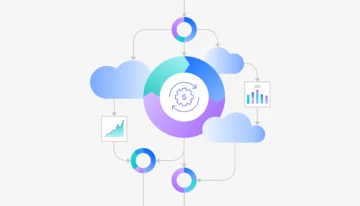
AI can be a force for good, but it might also lead to environmental and sustainability concerns. IBM is dedicated to the responsible development and deployment of this technology, which can enable our clients to meet their sustainability goals.
“AI is an unbelievable opportunity to address some of the world’s most pressing challenges in health care, manufacturing, climate change and more,” said Christina Shim, IBM’s global head of Sustainability Software and an AI Ethics Board member. “But it’s important to reap these benefits while minimizing the environmental impact. That means making more sustainable choices about how models are built, trained, and used, where processing occurs, what infrastructure is used, and how open and collaborative we are along the way.”
Design, adopt and train AI with attention to sustainability
Komisja Europejska Szacunki that over 80% of all product-related environmental impacts are determined during their design phase. As large language models (LLMs) grow in popularity, it is important to determine if an LLM is needed, or whether a traditional AI model will do. An artykuł from Columbia University states that LLM queries use up to five times more power than a traditional search engine. As data use and processing activities increase, so too will global emissions. Therefore, it is critical to design and manage systems sustainably.
IBM’s concrete actions to support AI sustainability
AI creation requires vast amounts of energy and data. According to the European Union’s 2023 Dyrektywa Energy Efficiency, Europe’s data center electricity consumption is expected to grow 28% from 2018 to 2030, exemplifying the environmental costs of AI usage. IBM has taken many steps toward mitigating its AI systems’ environmental impact. In our Raport wpływu 2023, we reported that 70.6% of IBM’s total electricity consumption came from renewable sources, including 74% of the electricity that IBM data centers consumed. In 2023, 28 data centers globally received 100% of their electricity from renewable sources.
IBM is focused on developing energy-efficient methods to train, tune and run AI models, such as its own Granit foundation models. At 13 billion parameter models, the Granite models are smaller and more efficient than larger models, and therefore can have a smaller impact on the environment.
In 2022, IBM introduced Świeczka, its first AI-optimized, cloud-native supercomputer. The design allows for efficient deployment and management of its infrastructure anywhere in the world, which helps to reduce strain on existing resources.
Other IBM products designed to support AI sustainability include:
- IBM® Envizi™, a suite of software products designed to help companies simplify their environmental, social and governance reporting.
- IBM TRIRIGA®, an integrated workplace management system that can help improve energy management.
- IBM Maximo®, which can help monitor, manage and maintain operations in ways that encourage sustainability across the asset lifecycle.
According to John Thomas, Vice President and Distinguished Engineer in IBM Expert Labs and an AI Ethics Board member, “It is encouraging to see growing interest from our clients to balance the benefits of generative AI with their long-term sustainability goals. Some of our leading clients are bringing this requirement into their enterprise AI governance frameworks.”
Holistic sustainability: Beyond environment to include societal impact
IBM aspires to make a lasting, positive impact on the environment, the communities in which we work and live, and business ethics. In 2021, IBM launched the IBM Akcelerator zrównoważonego rozwoju, a pro bono social impact program that applies IBM technologies, including AI, and expertise to enhance and scale nonprofit and government organization solutions. This program helps populations that are especially vulnerable to environmental threats. In 2024, IBM announced our latest request for proposal on the topic of resilient cities, which will aim to find ways to foster urban resiliency in the long term. IBM plans to increase the investment in the program by up to an additional $45 million over the next five years.
IBM also focuses on closing the skills gap in the workforce, including around AI and sustainability. Last year, IBM SkillsBuild® added a new selection of generative AI courses as part of our new AI training commitment. IBM also launched a new program zrównoważonego rozwoju to help equip the next generation of leaders with skills for the green economy. This free training connects cutting-edge technologies to ecology and climate change.
Focus on AI ethics and sustainability in the IBM ecosystem
IBM has long committed to doing business with dostawcy who conduct themselves with high standards of ethical, environmental and social responsibility. This commitment includes a code of conduct through the Responsible Business Alliance, where IBM is a founding member. We support this commitment by setting specific environmental requirements for our suppliers and by partnering with them to drive continual improvement.
In 2022, IBM completed its first commitment to promote AI ethics practices throughout our ecosystem, exceeding its target to train 1,000 ecosystem partners in technology ethics. In 2023, we announced a new commitment to train 1,000 technology suppliers in technology ethics by 2025, and we are well on our way.
AI can augment human intelligence, increase fairness, and optimize revenue, or detract from them. Regulations might compel some responsibility, but developers and users must consider people, planet and profit across their use of AI.
A human-centric approach to AI needs to advance AI’s capabilities while adopting ethical practices and addressing sustainability imperatives. As IBM infuses AI across applications, we are committed to using AI sustainably and empowering AI stakeholders to do so as well.
Learn more about IBM’s sustainability solutions
Learn more about AI ethics at IBM
Czy ten artykuł był pomocny?
TakNie
Więcej z danych i analityki



Biuletyny IBM
Otrzymuj nasze biuletyny i aktualizacje tematów, które dostarczają najnowszych informacji i spostrzeżeń na temat pojawiających się trendów.
Subskrybuj teraz
Więcej biuletynów
- Dystrybucja treści i PR oparta na SEO. Uzyskaj wzmocnienie już dziś.
- PlatoData.Network Pionowe generatywne AI. Wzmocnij się. Dostęp tutaj.
- PlatoAiStream. Inteligencja Web3. Wiedza wzmocniona. Dostęp tutaj.
- PlatonESG. Węgiel Czysta technologia, Energia, Środowisko, Słoneczny, Gospodarowanie odpadami. Dostęp tutaj.
- Platon Zdrowie. Inteligencja w zakresie biotechnologii i badań klinicznych. Dostęp tutaj.
- Źródło: https://www.ibm.com/blog/for-the-planet-and-people-ibms-focus-on-ai-ethics-in-sustainability/
- :ma
- :Jest
- :Gdzie
- $W GÓRĘ
- 00
- 000
- 1
- 110
- 13
- 15%
- 16
- 17
- 2%
- 2018
- 2021
- 2022
- 2023
- 2024
- 2030
- 28
- 29
- 300
- 39
- 400
- 42
- 5
- 54
- 6
- 7
- 70
- 9
- a
- Zdolny
- O nas
- przyśpieszyć
- przyśpieszony
- dostęp
- Stosownie
- dokładny
- w poprzek
- działania
- zajęcia
- w dodatku
- dodatek
- Dodatkowy
- adres
- adresowanie
- przyjąć
- Przyjęcie
- awansować
- zaawansowany
- Reklama
- AI
- Zarządzanie AI
- Modele AI
- Trening AI
- zmierzać
- Wszystkie kategorie
- Alians
- pozwala
- wzdłuż
- również
- kwoty
- amp
- an
- analityka
- i
- ogłosił
- każdy
- nigdzie
- Zastosowanie
- Application Development
- aplikacje
- dotyczy
- podejście
- kwiecień
- SĄ
- na około
- artykuł
- sztuczny
- sztuczna inteligencja
- Sztuczna inteligencja (AI)
- AS
- aspiruje
- kapitał
- At
- Uwaga
- zwiększać
- autor
- dostępny
- z powrotem
- Bilans
- BE
- staje
- Korzyści
- Poza
- Miliard
- Blog
- Niebieski
- deska
- członek zarządu
- Granice
- Przełamując
- Bringing
- budować
- wybudowany
- biznes
- biznes
- ale
- przycisk
- by
- oprawa ołowiana witrażu
- CAN
- możliwości
- węgiel
- karta
- Kartki okolicznosciowe
- który
- CAT
- Kategoria
- Centrum
- Centra
- wyzwania
- zmiana
- ZOBACZ
- wybory
- koła
- Miasta
- klasa
- klientów
- Klimat
- Zmiana klimatu
- zamknięcie
- Chmura
- kod
- współpracy
- kolor
- Columbia
- prowizja
- zobowiązanie
- zobowiązany
- społeczności
- Firmy
- Zakończony
- Obawy
- beton
- Prowadzenie
- łączy
- Rozważać
- budowy
- spożywane
- konsumpcja
- Pojemnik
- kontynuować
- kontynuując
- kopia
- Koszty:
- kursy
- tworzenie
- krytyczny
- istotny
- CSS
- zwyczaj
- Klientów
- pionierski nowatorski
- Najnowocześniejsze technologie
- dane
- Centrum danych
- centra danych
- zarządzanie danymi
- przechowywanie danych
- Bazy danych
- Data
- dedykowane
- Domyślnie
- definicje
- dostarczyć
- dostarczanie
- dostawa
- Kreowanie
- Prognozowanie popytu
- Działy
- zależy
- Wdrożenie
- opis
- Wnętrze
- zaprojektowany
- Mimo
- Wykrywanie
- Ustalać
- ustalona
- deweloperzy
- rozwijanie
- oprogramowania
- cyfrowy
- cyfrowy świat
- Wybitny
- do
- robi
- napęd
- podczas
- z łatwością
- EC
- gospodarka
- Ekosystem
- efektywność
- wydajny
- skutecznie
- elektryczność
- pobór prądu
- wschodzących
- emisje
- uprawniającej
- upoważnia
- umożliwiać
- zachęcać
- zachęcający
- energia
- silnik
- inżynier
- wzmacniać
- wzmocnione
- Wchodzę
- Enterprise
- Środowisko
- środowiskowy
- wyposażyć
- szczególnie
- niezbędny
- Eter (ETH)
- etyczny
- etyka
- Europa
- europejski
- Komisja Europejska
- Europ
- ewoluuje
- istnieć
- Przede wszystkim system został opracowany
- Wyjście
- Rozszerzać
- rozszerza się
- spodziewany
- Doświadczenia
- ekspert
- ekspertyza
- rozszerzenia
- wyciąg
- ułatwia
- uczciwość
- fałszywy
- Korzyści
- Znajdź
- i terminów, a
- pięć
- Skupiać
- koncentruje
- koncentruje
- obserwuj
- czcionki
- W razie zamówieenia projektu
- wytrzymałość
- Sprzyjać
- Fundacja
- założenie
- Ramy
- oszustwo
- wykrywanie oszustw
- Darmowy
- od
- dalej
- Zyski
- szczelina
- Gen
- generacja
- generatywny
- generatywna sztuczna inteligencja
- generator
- otrzymać
- Globalne
- Globalnie
- Gole
- dobry
- zarządzanie
- Rząd
- Zielony
- Krata
- Rosnąć
- Rozwój
- Rosnące zainteresowanie
- Have
- mający
- głowa
- Nagłówek
- Zdrowie
- Opieka zdrowotna
- ciężki
- wysokość
- pomoc
- pomocny
- pomaga
- Ukryty
- Wysoki
- wysoka wydajność
- W jaki sposób
- HTTPS
- człowiek
- ludzka inteligencja
- IBM
- IBM Cloud
- ICO
- ICON
- if
- obraz
- Natychmiastowy
- Rezultat
- Oddziaływania
- realizacja
- ważny
- podnieść
- poprawa
- in
- zawierać
- obejmuje
- Włącznie z
- Zwiększać
- wskaźnik
- osób
- Informacja
- Infrastruktura
- spostrzeżenia
- zintegrowany
- integracja
- Inteligencja
- odsetki
- najnowszych
- wprowadzono
- inwestycja
- Inwestycje
- IT
- JEGO
- John
- jpg
- Wiedzieć
- wiedza
- Labs
- język
- duży
- większe
- Nazwisko
- Ostatni rok
- trwały
- firmy
- uruchomiona
- prowadzić
- Przywódcy
- Przywództwo
- prowadzący
- wifecycwe
- lubić
- relacja na żywo
- llm
- miejscowy
- lokalny
- długo
- długoterminowy
- utrzymać
- konserwacja
- robić
- Dokonywanie
- zarządzanie
- i konserwacjami
- System zarządzania
- produkcja
- wiele
- Maksymalna szerokość
- znaczy
- Poznaj nasz
- członek
- metody
- może
- milion
- min
- minimalizowanie
- minuty
- łagodzenie
- Aplikacje mobilne
- model
- modele
- monitor
- jeszcze
- bardziej wydajny
- większość
- musi
- Nawigacja
- potrzebne
- wymagania
- Nowości
- Newsletter
- Następny
- Niedochodowy
- nic
- już dziś
- of
- poza
- oferta
- on
- koncepcja
- operacje
- Okazja
- Optymalizacja
- zoptymalizowane
- or
- organizacja
- organizacji
- ludzkiej,
- wybitny
- koniec
- własny
- strona
- Parallel
- parametr
- część
- partnerem
- Partnerstwo
- wzmacniacz
- Współpraca
- Ludzie
- jest gwarancją najlepszej jakości, które mogą dostarczyć Ci Twoje monitory,
- faza
- PHP
- planeta
- plany
- plato
- Analiza danych Platona
- PlatoDane
- wtyczka
- wtyczki
- polityka
- popularność
- populacje
- position
- pozytywny
- Post
- postgresql
- potencjał
- power
- mocny
- praktyki
- proroczy
- prezydent
- pilny
- pierwotny
- Pro
- wygląda tak
- przetwarzanie
- Produkty
- Zysk
- Program
- promować
- wniosek
- zapewniać
- jakość
- zapytania
- pytanie
- szybko
- szybko
- Czytający
- w czasie rzeczywistym
- zbierać
- Odebrane
- zmniejszyć
- regulamin
- niezawodność
- rzetelny
- Odnawialne
- Zgłoszone
- Raportowanie
- zażądać
- wymaganie
- wymagania
- Wymaga
- sprężysty
- Zasób
- Zasoby
- Odpowiedzi
- odpowiedzialność
- odpowiedzialny
- czuły
- dochód
- roboty
- krzepki
- run
- s
- Powiedział
- Skalowalność
- Skala
- Ekran
- skrypty
- bezszwowy
- Szukaj
- Wyszukiwarka
- bezpiecznie
- widzieć
- wybór
- seo
- ustawienie
- Share
- dzielenie
- znaczący
- upraszczać
- witryna internetowa
- umiejętności
- brak umiejętności
- mały
- mniejszy
- So
- Obserwuj Nas
- Wpływ społeczny
- społeczne
- Tworzenie
- Rozwiązania
- kilka
- wyrafinowany
- Źródło
- Źródła
- Sourcing
- specyficzny
- Łącza
- kwadraty
- interesariusze
- standardy
- stojaki
- początek
- Startowy
- Zjednoczone
- Ewolucja krok po kroku
- Cel
- przechowywanie
- Walka
- subskrybuj
- taki
- apartament
- Superkomputer
- dostawcy
- wsparcie
- Zrównoważony rozwój
- zrównoważone
- zrównoważony
- SVG
- system
- systemy
- Zadania
- cel
- zespół
- Technologies
- Technologia
- semestr
- trzeciorzędowy
- niż
- dzięki
- że
- Połączenia
- świat
- ich
- Im
- motyw
- sami
- w związku z tym
- Te
- to
- Tomasz
- myśl
- myśl przywództwo
- zagrożenia
- Przez
- poprzez
- czas
- czasy
- Tytuł
- do
- już dziś
- także
- Top
- aktualny
- Kwota produktów:
- w kierunku
- tradycyjny
- Pociąg
- przeszkolony
- Trening
- Trendy
- godny zaufania
- melodia
- i twitterze
- rodzaj
- uniwersytet
- odblokować
- niezrównany
- Nowości
- miejski
- URL
- Stosowanie
- posługiwać się
- używany
- Użytkownik
- Użytkownicy
- za pomocą
- wartość
- różnorodny
- Naprawiono
- wersja
- wice
- Wiceprezes
- Wrażliwy
- W
- Droga..
- sposoby
- we
- DOBRZE
- Co
- czy
- który
- Podczas
- KIM
- będzie
- w
- WordPress
- Praca
- Siła robocza
- Stanowisko pracy
- świat
- świat
- napisany
- rok
- lat
- Twój
- zefirnet












